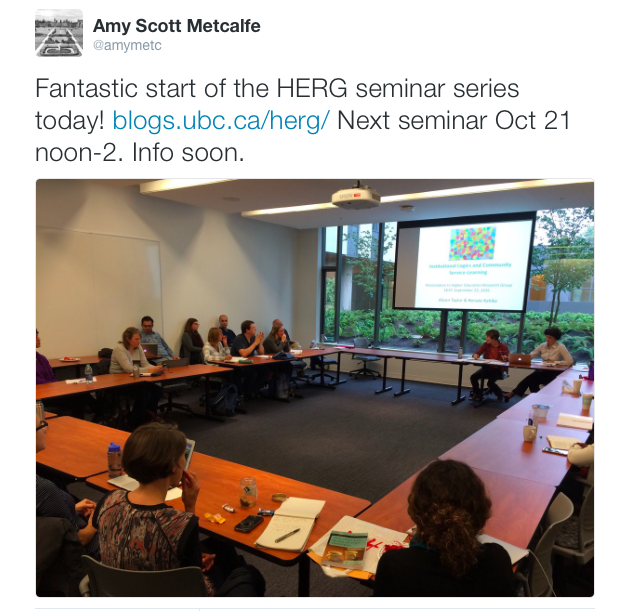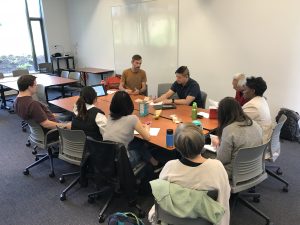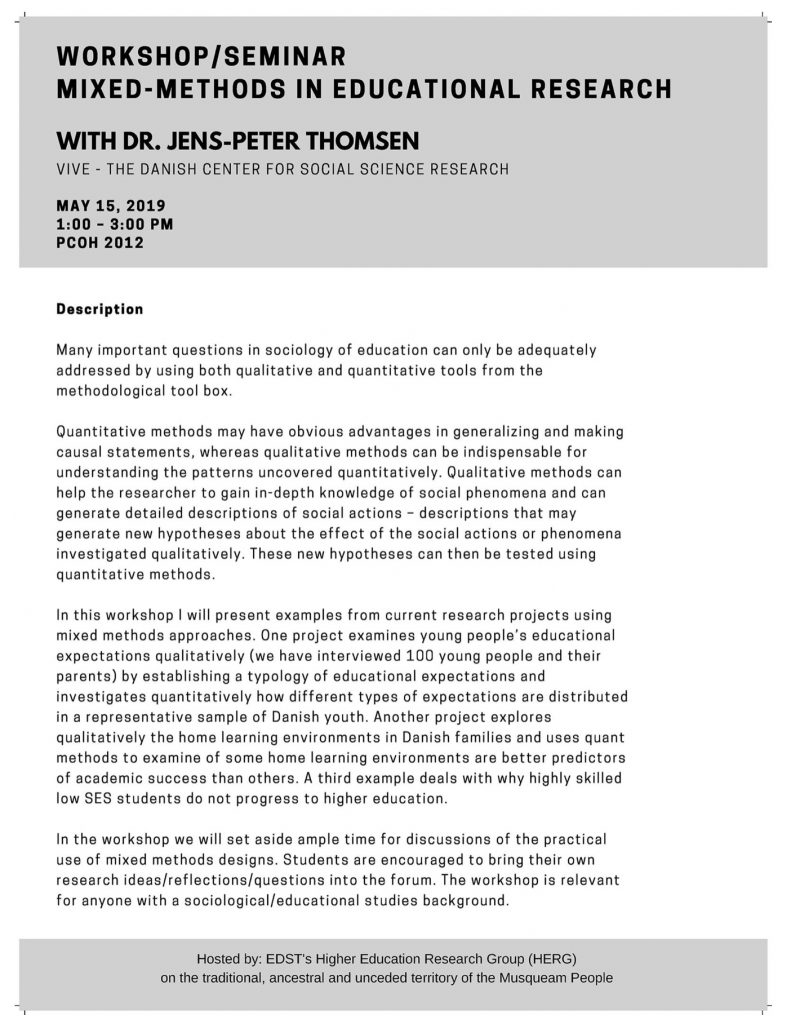Workshop/Seminar: Mixed-Methods in Educational Research
With Dr. Jens-Peter ThomsenHosted by EDST’s Higher Education Research Group (HERG)Wednesday, May 15, 20191:00 – 3:00 p.m.PCOH 2012Workshop
March 2019 seminar
HERG Presentations at EDST Research Day 2018

The Higher Education Research Group (HERG) Ignites!
April 6, 2018
EDST Research Day
Dr. Amy Metcalfe (session chair)
[“Ignite” format: 5 minute, rapid presentations]
Presenters (in alphabetical order):
Ashenafi Alemu (PhD student, EDST), “Researching” Silence in Educational Research: A (Modest) Proposal
Lisa Allen (EdD student, EDST), Being Precarious: An Autoethnographic Account of One Precarious Faculty Member’s Experience Working in Four BC Higher Education Institutions
Jed Anderson (PhD student, EDST), University Education as Ghost Town: The Decline of Higher Education in the Boundary and West Kootenay Regions of British Columbia
Takara A. Bond (PhD student, ECPS), The Interplay of Social Media Use, Academic Adjustment, and Self-Regulation
Lisa Brunner (PhD student, EDST), International Student Compliance Reporting: Higher Educational Institutions as the Eyes of the State?
Bernard Chan (MA student, EDST), Graduate Students and Parenthood: Formulating an Institutional Response
Logan Lorenz (MA student, EDST), Making Sense of the Indigenization of Student Affairs at a Canadian Higher Education Institution
Lindsey Kovacevic (MA student, EDST), Academic Capitalism and Faculty Service to the Institution
Kari Marken (PhD student, EDCP), A ‘Wicked Problem’ & ‘Wise Intervention’ in Higher Education: Storying Teaching and Learning Scholarship in the First Year Experience
Dale McCartney (PhD student, EDST), Emerging Forms of Internationalization: Pathway Colleges
Jude Walker (Assistant Professor, EDST), What Do We Mean by Research Impact?
March 2, 2018 HERG Seminar
Please join us for the next HERG seminar:
Friday, March 2, 2018 Noon-2:00
Ponderosa Oak House, room 1003
Dr. Rebecca D. Cox, Associate Professor, Faculty of Education
Simon Fraser University, Canada
(Faculty profile: http://www.sfu.ca/education/faculty-profiles/rcox.html)
Community Colleges and Student-Parents: Insights from a Cross-Country Comparative Study
Community colleges across the US and Canada offer a critical point of access to a range of neotraditional students, including students with dependent children. Yet colleges’ capacity to serve their students is complicated by the ongoing restructuring enabled by neoliberal policymaking. Not only does neoliberal ideology discount the effect of structural inequality on students’ postsecondary pathways, but it renders family relationships and caregiving responsibilities irrelevant to its emphasis on individual responsibility and market-based exchanges. In this presentation, I share insights from a comparative case study of two urban-serving community colleges, one in the US, and one in Canada. Designed to explore the colleges’ capacity to support student-parents, the study revealed the extent to which each college’s position vis-à-vis postsecondary competitors shaped its approach to supporting students with children.
Related Publication:
Cox, R.D., & Sallee, M. W. (2018). Neoliberalism across borders: A comparative case study of community colleges’ capacity to serve student-parents. The Journal of Higher Education 89(1), 54-80.
Ashenafi Alemu, PhD Candidate, Department of Educational Studies, UBC
(Student profile: http://edst.educ.ubc.ca/ashenafi-alemu/ )
“We are not born by choice”: Stories of Academic Public Intellectuals from the Global South
This paper reports the outcomes of life story interviews conducted to grasp the stories of academic public intellectuals from Global South. The interviews were conducted with three public intellectuals from the Global South, specifically from East Africa, who reside in the United States and Canada. Before conducting the interviews, the writer established the notion of public intellectual and symmetric criticality framework as a conceptual framework of this study. Participants were selected based on criteria established to identify them as public intellectuals which included their experiences in speaking to public, challenging the status-quo, engaging in critical reflexivity towards higher education, as well as being an accomplished, tenured academic in universities in the Global North. Their stories suggest that they developed the identity of public intellectual due to influences from their families and the compelling circumstances that forced them to speak to people and to power.
October 16, 2017 HERG Seminar
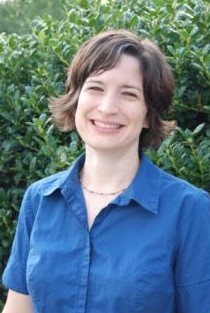
Dr. Margaret Sallee
Please join us in welcoming Dr. Margaret Sallee to UBC for this special guest lecture:
Monday, October 16, Noon-1:00
Multipurpose Room (rm 2012), Ponderosa Commons Oak House
Researching Work/Family Issues in Academia: Pushing the Boundaries
Abstract: The past two decades have seen a rise in a focus on work/family scholarship for faculty in the academy. While research has documented the challenges that men and women face navigating their personal and professional lives, much scholarship tends to rely on the same theoretical frameworks: ideal worker norms and Joan Acker’s (1990) influential work on gendered organizations, which ultimately leads to the replication of findings. In this talk, I will review the ways in which theory has been used in past scholarship and suggest some possible avenues for expansion. I conclude by providing a brief overview of a study on the experiences of commuting couples (or academics who live apart for work-related reasons) that employs a theory of motivation as a theoretical guide.
Dr. Margaret Sallee is Associate Professor of Higher Education at the University at Buffalo (State University of New York). She earned her Ph.D. in Urban Education and a Graduate Certificate in Gender Studies from the University of Southern California. Her research examines the intersection of individual experience and organizational culture to interrogate the ways in which gender and other social identities operate on university campuses, particularly with respect to faculty work and work/life balance issues. Her most recent book, Faculty Fathers: Toward A New Ideal in the Research University, was published in 2014 by the State University of New York Press (http://www.sunypress.edu/p-5991-faculty-fathers.aspx).
Talk sponsored by the Higher Education Research Group (HERG) and EDST GAAs
March 10, 2017 HERG Seminar
Please join us for the March HERG seminar:
Friday, March 10, 2017, 12:00-2:00, Multipurpose Room (room 2012), Ponderosa Commons Oak House
Sam Rocha, Assistant Professor, Department of Educational Studies, UBC
Philosophy of Education as “Pre Qualitative” Educational Research
Abstract:
This talk will be based on a forthcoming chapter in an edited book titled The Relationship and Need of Philosophy and History of Education (Rowman and Littlefield, 2017), which includes a critical response by Patti Lather. My argument begins with a descriptive sense of the dire straits of humanistic research in the field of education today and suggests that the bulk of the historical blame is best placed on John Dewey’s scientific conception of the field in the late 1900s. I then work to present a constructive role for philosophy inspired by, yet critical of, the “post-qualitiative” turn in educational research advocated by Elizabeth Adams St. Pierre, where philosophy (and history) of education becomes a “pre-qualitative” form of educational research. I end by suggesting that the Deweyan Era of the academic field of education within the University may need to end, bringing with it a realignment of the predominance of the social sciences as the modus operandi of educational research.
Full transcript of the talk available online:
https://www.academia.edu/31799311/Philosophy_of_Education_as_Pre_Qualitative_Educational_Research
Kristi Carey, MA Student, The Social Justice Institute, UBC
On Cleaning: Student Activism in the Corporate and Imperial University
February 3, 2017 HERG Seminar
Please join us for the next HERG seminar:
Friday, February 3, 2017, 12:00-2:00, Multipurpose Room (room 2012), Ponderosa Commons Oak House
Cash Ahenakew, Assistant Professor, Department of Educational Studies, UBC
Grafting Indigenous Ways of Knowing Onto Non-Indigenous Ways of Being: The (Underestimated) Challenges of a Decolonial Imagination
Abstract:
This article examines issues that arise when Indigenous epistemologies are interpreted through non-Indigenous ontologies in research settings. I use the concept of grafting to refer to the act of transplanting ways of knowing and being from a context where they emerge naturally to a context where they are artificially implanted. I start exploring this context through a poem that outlines the difficulties Indigenous people tend to face when inhabiting academic spaces whose architecture is built on the violent historical foundations of modernity. Next, I briefly outline critiques of recognition and inclusion in political and educational spheres to highlight how liberal discourses have tended to offer only conditional forms of integration that support dominant ways of thinking by presenting them as benevolent and inclusive. I then turn to a discussion of the implications of this analysis for Indigenous research methodologies. I conclude with tentative suggestions for further work in this area.
Referencing this recently published article:
Ahenakew, C. (2016). Grafting Indigenous ways of knowing onto non-Indigenous ways of being. International Review of Qualitative Research, 9(3), 323-340. http://irqr.ucpress.edu/content/9/3/323
Aurelia Kinslow, PhD Candidate, Department of Curriculum and Pedagogy, UBC
Aboriginal Student and Community Development Officer, First Nations House of Learning, UBC
Treading the Path of the Heart
Abstract:
Weaving in and out of dialogue with her animal helpers in spirit, each aspects of self, the author reflects on the ways movement and displacement continuously shape her relationship to her identity as an Indigenous woman, as a student and as a researcher. This piece engages storytelling, choreography and received knowledge to touch on notions of nomadism and becoming from an Indigenous perspective.
Published in the following article:
Kinslow, A. (2013). Treading the path of the heart. Decolonization: Indigeneity, Education & Society, 2(2), 83-91. http://decolonization.org/index.php/des/article/view/19610
Seminar on November 18, 2016
Please join us for the next HERG seminar:
Friday, November 18, 2016, 12:00-2:00, Multipurpose Room (room 2012), Ponderosa Commons Oak House
Michelle Nilson, Associate Professor, Education, SFU
Building Canadian Higher Education Community Resources
Canadian higher education scholars draw largely on the body of literature that originates in the United States, with some instances of literature coming from the United Kingdom or Australia. If we were to mark the beginning of higher education scholarship in Canada (e.g., as distinct from scholars whose research context is higher education institutions) by the founding date of the Canadian Journal of Higher Education and Canadian Society for the Study of Higher Education, the field in Canada is just shy of 50 years old. This is half the age of analogous societies in the United States but older than CHER in Europe, which was founded in 1988. Over those 50 years, participation in the knowledge building of the field has remained narrow, with just a handful of scholars producing the bulk of the resources and research. In this presentation, I share two examples of efforts aimed at expanding the capacity and resources of the field while also encouraging the participation of emerging scholars. Then, I will share my personal journey through the process of book publication as one avenue for contributing to the body of higher education scholarship in Canada.
Referencing this recently published book:
Shanahan, T.R., Nilson, M.J., & Broshko, L. (Eds.). (2016). The Handbook of Canadian Higher Education Law. McGill-Queen’s Press-MQUP. http://www.mqup.ca/handbook-of-canadian-higher-education-law–the-products-9781553394426.php
and
Compendium of Canadian Postsecondary Education Data Sources.
Available online at: https://www.sfu.ca/education/cselp/CSELP-research/publications/compendium-cdn-postsecondary-ed-data.html
Thanks for attending October 21, 2016!
Thanks to our presenters for the October 21, 2016 HERG Seminar!
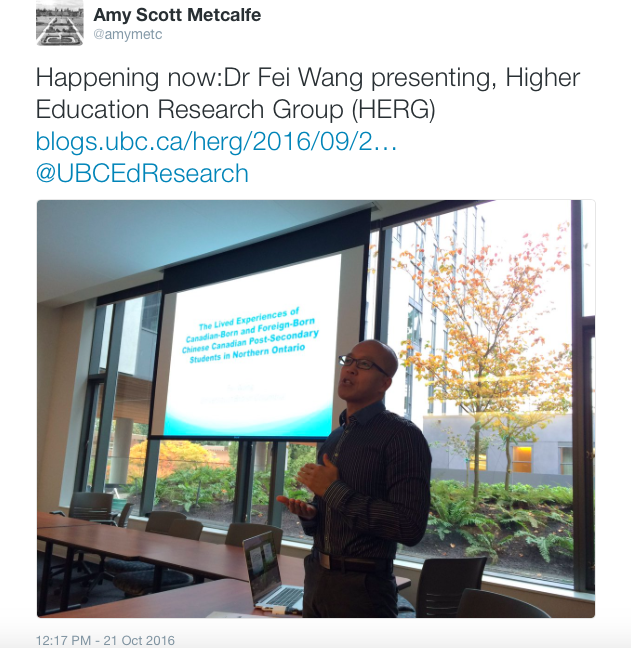
Fei Wang
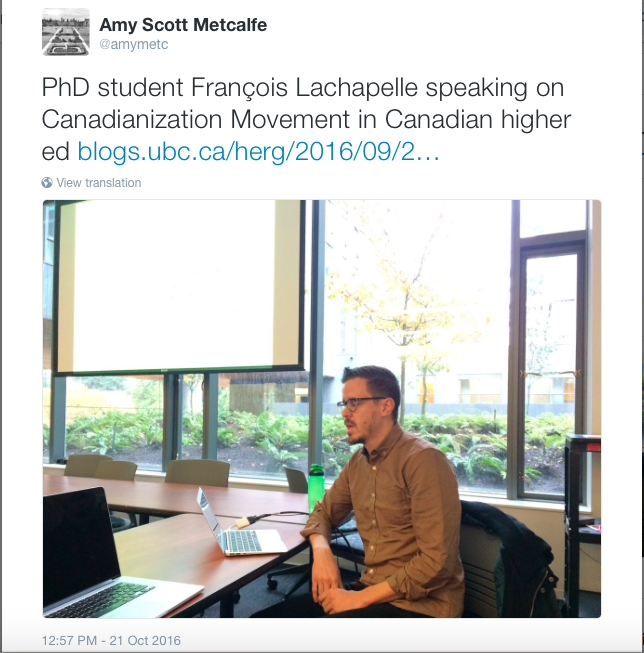
Thanks for attending on Sept 23!
